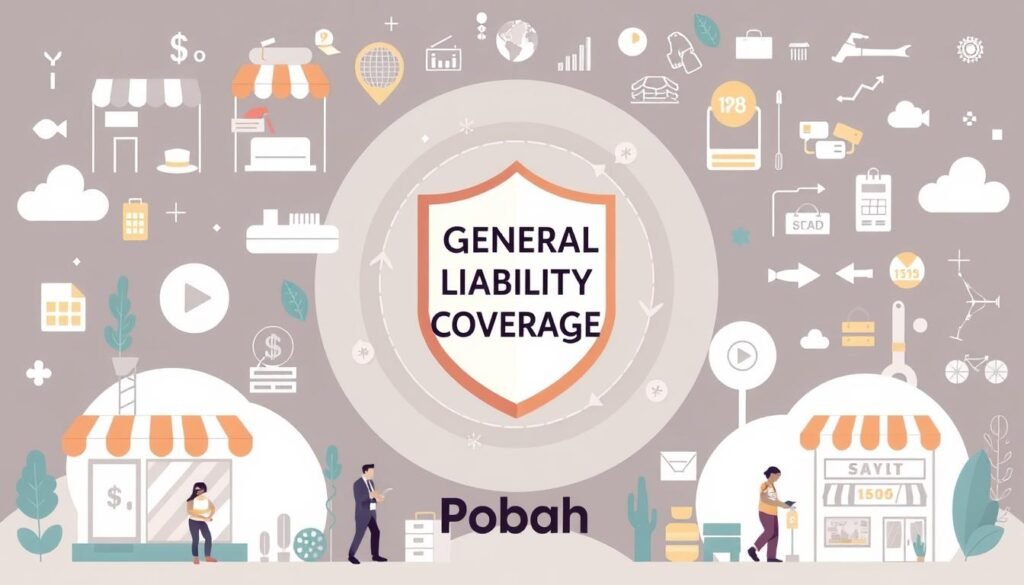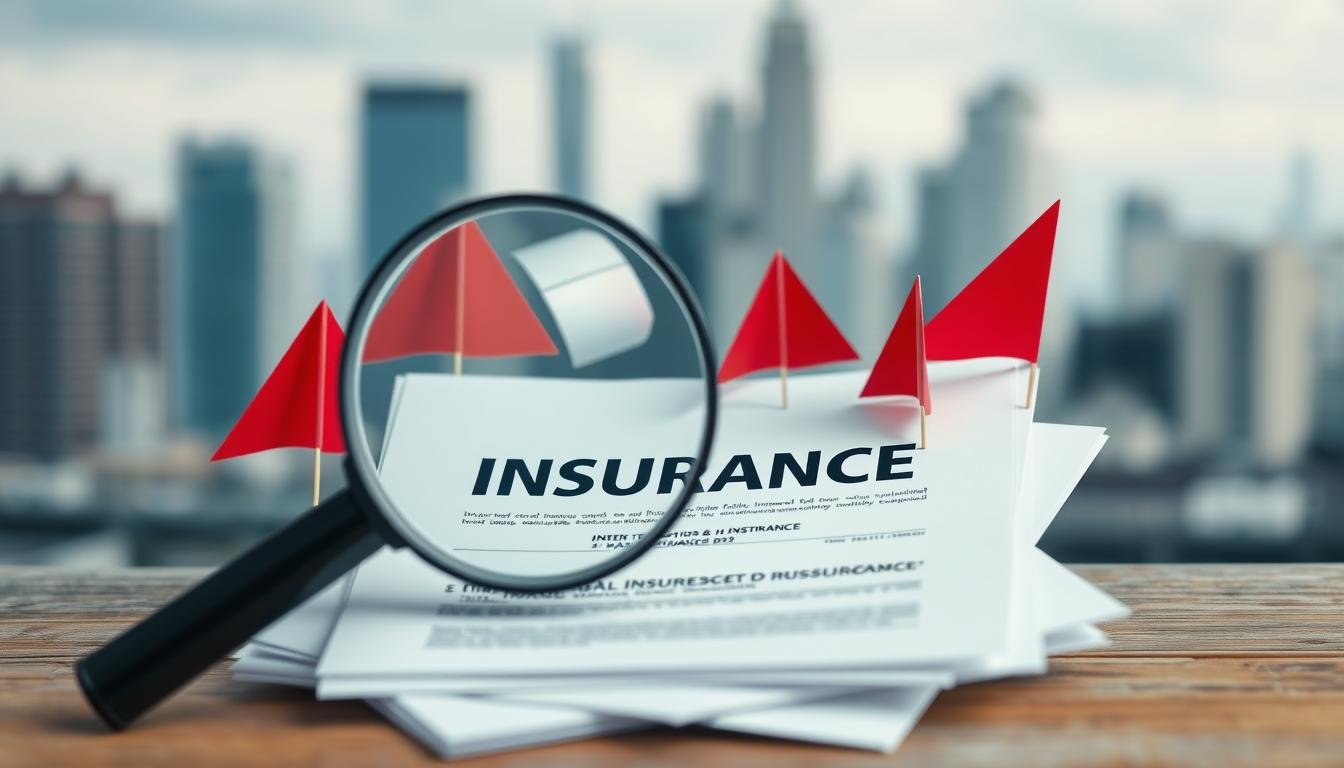Welcome to our guide on general liability insurance for small businesses. As a small business owner, keeping your business safe is key. Knowing how to get the right liability coverage is a big step. General liability insurance is like a shield for your business, protecting it from common risks and helping it recover from unexpected events.
In this guide, you’ll learn about different policies, what general liability coverage includes, and how it can help your business. You’ll see how small business insurance can make a big difference for your operation.
Key Takeaways
- General liability insurance protects against various risks facing small businesses.
- Understanding the types of liability coverage for small businesses is essential for adequate protection.
- Securing quality coverage can enhance customer trust and credibility.
- Assessing business risks is crucial for determining the right coverage.
- Comparing quotes helps in finding affordable business insurance options.
- Being aware of common exclusions can prevent surprises in times of need.
Understanding General Liability Insurance
General liability insurance is key for businesses to protect themselves from many risks. It helps shield companies from claims about bodily injuries, property damage, and personal injury. This insurance acts as a safety net, letting your business run smoothly without fear of lawsuits.
Definition of General Liability Insurance
General liability insurance covers a lot of incidents that might happen at work. It pays for medical bills from injuries on your property, damages to other people’s stuff, and personal injury claims. With this insurance, you can rest easy knowing your business is ready for anything.
Importance of General Liability Coverage
General liability coverage is very important, especially for small businesses. It not only protects your money but also makes your business look good to customers and partners. Without it, your business is at risk of huge legal costs that could hurt your finances and operations.
Types of Liability Coverage for Small Businesses
It’s key to know the different types of liability coverage for small businesses. Each type helps protect against unique risks. Here are the main types of liability insurance you should look into:
Commercial General Liability (CGL) Insurance
Commercial general liability insurance is a must for any small business. It covers claims for bodily injury and property damage during business activities. For example, if a customer gets hurt in your store, CGL insurance pays for medical bills and legal costs. It’s a crucial part of protecting your business.
Professional Liability Insurance
Service-based businesses need professional liability insurance. It guards against claims of negligence or errors in professional services. If a client loses money because of your service, this insurance helps with legal defense and settlements.
Product Liability Insurance
Businesses that make or sell products must have product liability insurance. It shields against risks from product defects that could harm people or property. If a product from your business hurts someone, this insurance covers legal costs and damages.

| Type of Liability Insurance | Coverage Description | Ideal For |
|---|---|---|
| Commercial General Liability (CGL) | Protects against bodily injury and property damage claims | All small businesses |
| Professional Liability | Covers claims of negligence or mistakes in professional services | Service-oriented businesses |
| Product Liability | Protects against claims related to product defects | Manufacturers and retailers |
Benefits of Small Business Liability Insurance
Understanding the benefits of small business liability insurance is key for business owners. It offers vital protection against many risks. This helps keep your assets safe and builds trust with customers.
Protecting Your Business Assets
Liability insurance is crucial for protecting your business’s money. Without it, unexpected lawsuits or claims can be very costly. These costs can add up fast, putting your assets at risk.
By getting liability insurance, you create a safety net. This lets your business run smoothly, without worrying about financial disaster from unexpected events.
Building Customer Trust and Credibility
Building trust with customers is vital for small businesses. Having liability insurance shows you’re professional and accountable. It makes customers feel safe, knowing your business is ready for any claims.
This trust can make your reputation stronger. It helps keep customers loyal, creating a lasting relationship that benefits both your business and your customers.

What Does General Liability Coverage Include?
General liability coverage is key for protecting your business from many risks. It has different parts to help keep you safe from claims that might happen. Knowing about these parts is important for your business to stay strong and successful.
Coverage for Bodily Injury
This part of general liability coverage is very important. It helps your business if someone gets hurt because of your business. This could be:
- Medical bills for the injured person.
- Legal costs to defend against claims.
- Money paid out in court judgments or settlements.
Coverage for Property Damage
This part covers damage to other people’s property because of your business. For example:
- Damage to a client’s property while you’re working.
- Accidental damage during product delivery.
- Legal fees for property damage disputes.
Personal and Advertising Injury Coverage
This part protects your business from claims that don’t involve physical harm. It includes things like:
- Claims of defamation or slander.
- Allegations of false advertising.
- Issues with using someone else’s intellectual property.

| Type of Coverage | Protections Offered | Examples of Claims |
|---|---|---|
| Coverage for Bodily Injury | Medical expenses, legal fees, settlements | Slip and fall incidents, accidents during service |
| Coverage for Property Damage | Compensation for damages, legal costs | Damage from service errors, accidental incidents |
| Personal and Advertising Injury Coverage | Defamation, false advertising protection | Slander lawsuits, copyright claims |
The Ultimate Guide to General Liability Insurance for Small Businesses
General liability insurance is key for small business owners to protect their assets. This guide covers everything you need to know about this insurance. It includes details on coverage, policies, and how to make the right choices.
Comprehensive liability insurance can protect your business from unexpected events. It covers injuries, property damage, and other liabilities that might happen. By understanding your insurance needs well, you can keep your business safe from potential claims.

It’s vital to know about the different types of liability coverage. Each policy meets specific needs, affecting your risk management. Knowing this helps you choose the right insurance for your business.
When looking at your business’s risks, carefully review your current insurance. This guide stresses the need for insurance that fits your business goals.
In short, learning about comprehensive liability insurance helps you make smart choices for your business. Spend time to learn about this important coverage. This way, your business will stay strong and safe.
How to Determine the Right Coverage for Your Business
Finding the right insurance for your business is key to its success. Start by looking at all the risks your business might face. This means figuring out the dangers linked to your industry and how you run things. Knowing these risks helps you pick the right insurance.
Assessing Your Business Risks
Think about different things like workplace safety, how you deal with customers, and what you sell or do. The more you know about possible risks, the better you can choose insurance that fits your business. For example, if you often meet with clients, you might need more protection than a business that doesn’t.
Evaluating Your Insurance Needs
Choosing the right insurance is more than picking a policy. Many things affect what you need, like how big your business is, where you work, and what laws you must follow. Using a careful method can help you find the best insurance for entrepreneurs.
It’s smart to talk to insurance experts who know about your business type. They can give you advice that fits your business perfectly. This way, you make choices that protect your business from unexpected problems.
| Factor | Influence on Insurance Needs |
|---|---|
| Business Size | Larger businesses may face higher risks and require more extensive coverage. |
| Operating Environment | A hazardous environment demands additional safety measures and coverage. |
| Customer Interaction | More direct customer interaction increases liability exposure and insurance requirements. |
Finding Affordable Business Insurance Options
Many entrepreneurs look for affordable business insurance. The key is to find the best deals that fit your needs. By comparing quotes from different providers, you can find great coverage at a low price.
Comparing Quotes from Different Providers
Begin by getting quotes from several insurance companies. This lets you see the prices and options available for your business. Look at important details like:
- Coverage limits
- Deductibles
- Exclusions
- Policy terms
Comparing quotes is key to not overpaying for your coverage. Use online tools to get quotes from many providers. Also, talk to local agents for personal advice and special deals that might fit your business.
Tips for Negotiating Premium Rates
After getting quotes, try to negotiate better rates. Here are some tips to help:
- Emphasize your business’s safety record.
- Show you’re serious about managing risks.
- Use your loyalty to the company if you’re a long-time customer.
- Ask about discounts for bundling other insurance types.
These tips can help you get more coverage for less money. By comparing and negotiating well, you can find affordable insurance that meets your business’s needs.
Common Exclusions in Liability Insurance Policies
It’s important to know about common exclusions in liability insurance policies. This knowledge helps you understand what your policy doesn’t cover. Knowing these exclusions can help protect your business from unexpected costs.
Understanding Policy Limitations
Every liability insurance policy has its own limits. These limits help insurers manage risks and keep premiums low. Knowing these limits is key to avoiding coverage gaps. Important things to look at include:
- Intentional Acts: Coverage doesn’t apply to damages from deliberate actions.
- Contractual Liability: Obligations from contracts are usually not covered.
- Employment Practices: Issues like wrongful termination or harassment might not be covered.
Special Exclusions to Be Aware Of
There are also specific exclusions based on your industry or business type. Knowing these can prevent misunderstandings. Key areas to watch include:
- Professional Services: Professional services often need their own coverage.
- Pollution Liability: Environmental claims might need extra policies.
- Cyber Liability: Digital breaches usually need special coverage.
| Exclusion Type | Description |
|---|---|
| Intentional Acts | No coverage for damages from deliberate actions. |
| Contractual Liability | Obligations from contracts are not covered. |
| Professional Services | Needs extra coverage for professional services. |
| Pollution Liability | Environmental damage claims might need special policies. |
| Cyber Liability | Coverage for digital breaches is usually outside standard policies. |
Understanding these exclusions helps you assess your insurance needs better. It protects your business from potential risks.
Legal Considerations for Small Business Owners
As a small business owner, you must navigate the complex world of legal rules. It’s key to understand your liability insurance needs to reduce risks. Knowing your obligations helps you manage your business well and keep it safe legally.
Understanding Your Obligations
Getting liability insurance is just the start. You also need to know the local, state, and federal laws. This knowledge helps avoid legal problems and protects your business.
Make sure your insurance policy keeps up with your business changes. This way, it will always cover your assets properly.
When to Seek Legal Advice
Knowing when to get legal help is crucial for your business. You might need a lawyer for:
- Helping with contracts that protect your business.
- Dealing with legal issues with clients, vendors, or employees.
- Understanding complex parts of your insurance policy.
Talking to a lawyer helps you understand your legal duties. It also improves your decisions on managing risks and following the law.
| Scenario | Seek Legal Advice? |
|---|---|
| Drafting a new contract | Yes |
| Receiving a complaint or lawsuit | Yes |
| Reviewing insurance policy terms | Yes |
| General business operations | No |
Conclusion
General liability insurance is key for small business owners. It protects against unexpected risks. Knowing about different types of coverage helps keep your business safe.
This guide helps you understand what you need. It’s a tool to make smart choices for your business. This way, you can run your business with confidence.
Choosing the right insurance for your business is important. It helps you understand and manage risks. This builds trust with your customers.
Getting the right insurance is a smart move. It helps your business grow and succeed. Being informed and prepared lets you focus on your business goals.
FAQ
What is general liability insurance?
General liability insurance protects businesses from claims like bodily injuries and property damage. It’s a key layer of protection for small businesses. It ensures financial security in case of unexpected incidents.
Why do small businesses need liability coverage?
Small businesses need liability coverage to protect their assets from financial loss. Without it, they could face huge legal expenses and damages. This could harm their financial health and even shut them down.
What types of liability coverage are available for small businesses?
Small businesses can choose from several liability coverage types. Commercial General Liability (CGL) insurance covers bodily injury and property damage. Professional Liability Insurance protects against negligence claims. Product Liability Insurance is key for businesses that make or sell products.
What are the benefits of having small business liability insurance?
Liability insurance for small businesses protects their assets and boosts trust with customers. It gives peace of mind and can improve your reputation. It also encourages customer loyalty.
What does general liability coverage typically include?
General liability coverage usually includes protection for bodily injury and property damage. It also covers personal and advertising injury, like defamation or copyright infringement claims.
How can I determine the right coverage for my business?
To find the right coverage, assess your business risks. Look at potential hazards and consider your business size, industry, and customer interactions. This helps you choose the right type and level of coverage.
How can I find affordable business insurance options?
To find affordable insurance, compare quotes from different providers. Look for the best value for your needs. Negotiate rates by highlighting your business’s safety and loyalty to the insurer.
What are some common exclusions in liability insurance policies?
Policies often exclude coverage for intentional acts, high-risk activities, and specific incidents. Knowing these exclusions helps you understand your policy better and ensure your business is protected.
What legal considerations should small business owners keep in mind?
Small business owners should know their legal obligations regarding liability insurance. This includes state regulations and contractual requirements. It’s also important to seek legal advice when needed, especially during contract drafting or legal disputes.




